QUOTES FROM ALLIED LEADERS:
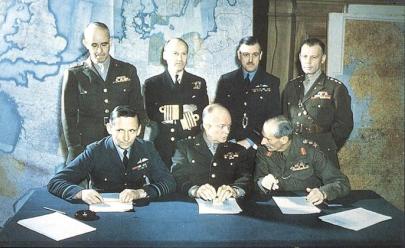
What the Leaders Were Saying
The following are quotations from important World War II Allied leaders. Each reveals a bit more about what they were thinking and how they presented the war to the public. Some of these remarks were made even before the United States entered World War II, and show reflection on the war after its end.
President Franklin D. Roosevelt
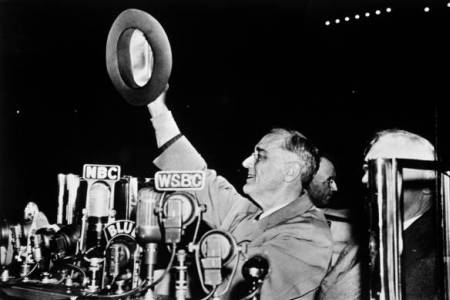
June 30, 1938
“Freedom to learn is the first necessity of guaranteeing that man himself shall be self-reliant enough to be free. … If the fires of freedom and civil liberties burn low in other lands they must be made brighter in our own. If in other lands the press and books and literature of all kinds are censored, we must redouble our efforts here to keep them free. If in other lands the eternal truths of the past are threatened by intolerance we must provide a safe place for their perpetuation.”
-- Address to the National Education Association
December 29, 1940
“We must be the great arsenal of Democracy.”
-- Fireside Chat on National Security, Washington, D.C.
January 9, 1941
“As a nation, we may take pride in the fact that we are softhearted; but we cannot afford to be soft-headed.”
-- Eighth State of the Union Address
January 9, 1941
“We know that enduring peace cannot be bought at the cost of other people's freedom.”
-- Eighth State of the Union Address
December 8, 1941
“Yesterday, December 7, 1941 — a date which will live in infamy — the United States of America was suddenly and deliberately attacked by naval and air forces of the Empire of Japan.”
-- Address to Congress after the attack on Pearl Harbor
December 8, 1941
“Hostilities exist. There is no blinking at the fact that our people, our territory and our interests are in grave danger. With confidence in our armed forces, with the unbounding determination of our people, we will gain the inevitable triumph, so help us God.”
-- Address to Congress after the attack on Pearl Harbor
General Dwight D. Eisenhower
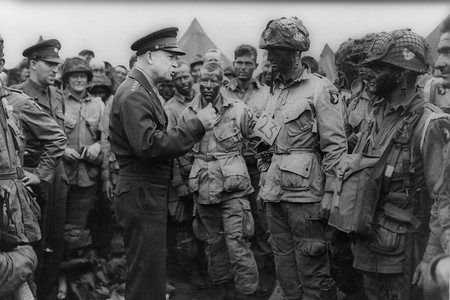
August 27, 1942
“This is a long tough road we have to travel. The men that can do things are going to be sought out just as surely as the sun rises in the morning. Fake reputations, habits of glib and clever speech, and glittering surface performance are going to be discovered.”
-- Letter to Vernon Prichard (27 August 1942), published in The Papers of Dwight David Eisenhower (1970) edited by Alfred Dupont Chandler, p. 505
June 12, 1945
“Kinship among nations is not determined in such measurements as proximity of size and age. Rather we should turn to those inner things — call them what you will — I mean those intangibles that are the real treasures free men possess.”
-- London Guild Hall Address
January 10, 1946
“I hate war as only a soldier who has lived it can, only as one who has seen its brutality, its stupidity.”
-- Speech in Ottawa
General George S. Patton
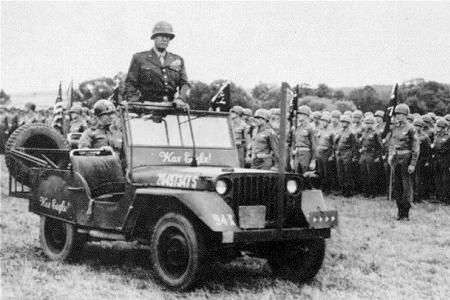
June 7, 1945
“It is foolish and wrong to mourn the men who died. Rather we should thank God that such men lived.”
-- Speech at the Copley Plaza Hotel, Boston Massachusetts
1947
“Never tell people how to do things. Tell them what to do, and they will surprise you with their ingenuity.”
-- War As I Knew It (1947) by George S. Patton, "Reflections and Suggestions"
General Douglas MacArthur
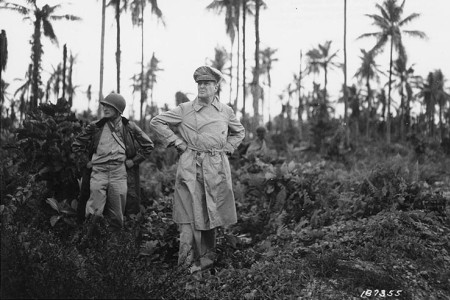
March 17, 1942
“It was close; but that's the way it is in war. You win or lose, live or die — and the difference is just an eyelash.”
-- To Gen. Richard Sutherland after their flight over Japanese held territory to reach Australia
September 2, 1945
“We have known the bitterness of defeat and the exultation of triumph, and from both we have learned there can be no turning back. We must go forward to preserve in peace what we won in war.”
-- Radio broadcast after the surrender of the Japan on the battleship USS Missouri officially ending World War II
Prime Minister Winston Churchill
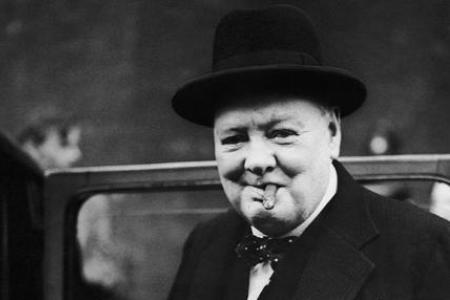
October 1, 1939
"I cannot forecast to you the action of Russia. It is a riddle wrapped in a mystery inside an enigma."
-- BBC broadcast (“The Russian Enigma”), London, October 1, 1939
May 13, 1940
"I have nothing to offer but blood, toil, tears and sweat."
-- Speech in the House of Commons, after taking office as Prime Minister
May 13, 1940
"What is our policy? ... to wage war against a monstrous tyranny, never surpassed in the dark, lamentable catalogue of human crime."
-- Speech in the House of Commons, after taking office as Prime Minister
June 18, 1940
“Let us therefore brace ourselves to our duties, and so bear ourselves that, if the British Empire and its Commonwealth last for a thousand years, men will still say, 'This was their finest hour.'”
-- Speech in the House of Commons, "War Situation"
August 20, 1940
"Never in the field of human conflict was so much owed by so many to so few."
-- Speech in the House of Commons, also known as "The Few", famous as the origin of the popular phrase "never was so much owed by so many to so few", complimenting the pilots in the Royal Air Force during the Battle of Britain
February 9, 1941
“We shall not fail or falter; we shall not weaken or tire. Neither the sudden shock of battle, nor the long-drawn trials of vigilance and exertion will wear us down. Give us the tools and we will finish the job.”
-- BBC radio broadcast
October 19, 1941
“Never give in — never, never, never, never, in nothing great or small, large or petty, never give in except to convictions of honour and good sense. Never yield to force; never yield to the apparently overwhelming might of the enemy.”
-- Speech given at Harrow School, Harrow, England
September 6, 1943
“The empires of the future are the empires of the mind.”
-- Speech at Harvard University
February 27, 1945
“It is a mistake to look too far ahead. Only one link in the chain of destiny can be handled at a time.”
-- Speech in the House of Commons, "Crimea Conference"
Prime Minister Neville Chamberlain
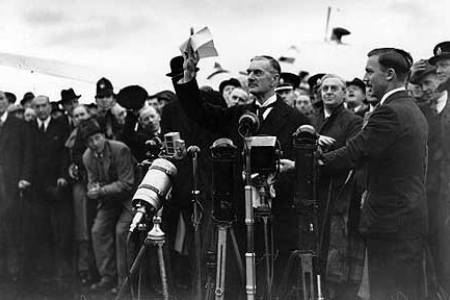
July 3, 1938
“In war, whichever side may call itself the victor, there are no winners, but all are losers.”
-- Speech at Kettering
Sept. 3, 1939
“It is evil things that we will be fighting against—brute force, bad faith, injustice, oppression and persecution—and against them I am certain that the right will prevail.”
-- Broadcast from the Cabinet Rooms at 10 Downing Street
TAKE ACTION:


EDUCATION PROJECTS:
Student Travel – WWII Educational Tours
High school and college students, learn the leadership principles that helped win WWII on a trip to France or during a weeklong residential program in New Orleans. College credit is available, and space is limited.
See You Next Year! HS Yearbooks from WWII
Collected from across the United States, the words and pictures of these yearbooks present a new opportunity to experience the many challenges, setbacks and triumphs of the war through the eyes of America’s youth.
The Victory Gardens of WWII
Visit the Classroom Victory Garden Project website to learn about food production during WWII, find lesson plans and activities for elementary students, get tips for starting your own garden and try out simple Victory Garden recipes!
The Science and Technology of WWII
Visit our new interactive website to learn about wartime technical and scientific advances that forever changed our world. Incorporates STEM principles to use in the classroom.
Kids Corner: Fun and Games!
Make your own propaganda posters, test your memory, solve puzzles and more! Learn about World War II and have fun at the same time.



